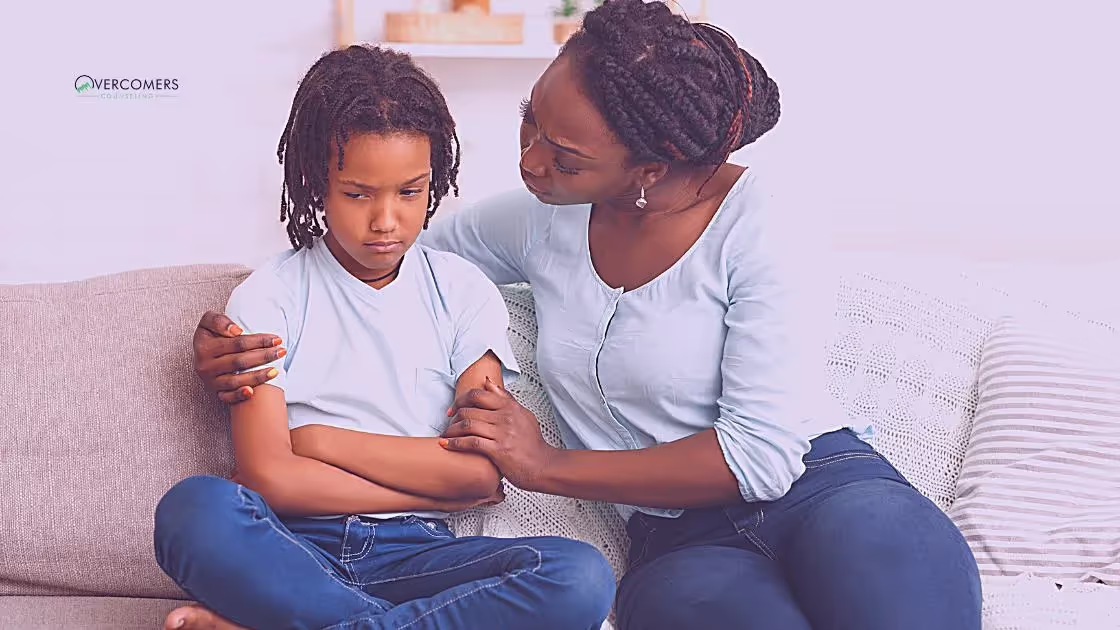Losing a loved one can be very complicated and heartbreaking for any adult, but for children, the death of a loved one can be very confusing and emotionally...

Losing a loved one can be very complicated and heartbreaking for any adult, but for children, the death of a loved one can be very confusing and emotionally upsetting.
It is easy to avoid speaking about a deceased loved one because of the sad memories and thoughts it brings.
However, as a parent, it is your responsibility to discuss the deceased with your child, help them navigate through their grief, and provide answers to their questions.
For one, discussing the deceased with your child helps them cope with grief.
It is easy for young children to be confused after losing a loved one.
They may experience difficulty grieving or understanding grief at all.
Talking about the deceased person can help them walk through their grieving process.
Also, discussing the deceased with your child creates a special bond between you and your child.
When you form a bond with your child, it is easier to provide the necessary support for grief, as you can depend on each other due to the similar emotions you share.
Furthermore, children may feel the death of a loved one is their fault and may begin to feel guilty.
Speaking to your child about the cause and circumstances surrounding the death of a loved one can help them understand the situation and eradicate feelings of guilt.
Read on to learn more reasons why you should discuss the deceased with your child:
One of the reasons you should discuss the deceased with your child is that it helps them cope with the grief of losing a loved one.
It is easy to assume that your child is too young to understand the death of a loved one, so they won't worry about grieving that person, but that is not true.
When someone your child loves dies, it saddens them and leaves them feeling distraught.
They may also be curious about the deceased or death itself.
Having your child discuss their worries and feelings with you is essential because it may help answer their questions and make grieving easier.
A grieving child needs clear and understandable words.
Therefore, when discussing a deceased person with your child, try to be intentional in your speech and your choice of words.
Do not use euphemisms.
Using words like "we lost him" or " in a deep sleep" will not help a child understand the concept of death.
The aim is to clarify their feelings and not confuse them any further.
Furthermore, remember that the process of grief is different for everyone.
Even after discussing the deceased with your child, it may take a while for them to start their grieving process.
You should ensure that you let your child understand that you will be by their side whenever they are ready.
Another reason to discuss the deceased with your child is that it can create a stronger bond between you and your child.
When you get together with your child and talk about the death of a loved one, it can uniquely unite both of you because you share memories and experiences about the same person.
Discussing the deceased with your child allows you to share experiences, ask questions and listen to your child. It also helps your child to feel less alone in their grief.
In many instances, family members who grieve together become intentional about supporting and looking out for each other.
Also, communicating with your child about the deceased can improve your parent-child relationship.
Your child may find it easier to express their feelings with you and rely on you for emotional and physical support because they believe you understand how they feel.
Furthermore, developing a tight bond with your child in the wake of losing a loved one makes grieving easier because both of you see one another as a shoulder to rely on.
One of the reasons to discuss the deceased with your child is to mitigate the guilt they may feel after the death of a loved one.
Children have a limited understanding of why things happen the way they do, and due to the lack of how or why people die, they may feel guilty after the death of a loved one.
Children are fond of magical thinking and may often believe their thoughts and wishes can make things happen.
When something terrible happens, like the death of a loved one, they may start to think it happened because of something they said, wished for, or thought about.
As a parent, you should check to see if your child feels responsible in any way while discussing a deceased person.
Also, the feeling of guilt can come from thinking there is something they could have done or should have done to prevent the person's death.
For instance, your child may feel guilty for surviving an incident that caused the death of a sibling or friend, especially if they were both in an accident and were the only ones who survived.
Talking to your child about the deceased's death, what caused their death, or how they died may make your child feel less guilty.
Getting rid of their guilt may start their grieving process and help them grieve properly.

Another reason you should discuss the deceased with your child is that it can help them feel comfortable talking about their emotions.
Bottled-up emotions can result in anger and resentment.
Therefore, talking about the deceased can help your child manage their feelings better and reduce their emotional burden.
As a parent, not giving your child the freedom to speak on how they have been affected by the death of their loved one can negatively impact their mental well-being.
Depression and negative thoughts may start to cross their minds when they do not have a channel to vent and let out their emotions.
Also, discussing the death of a person with your child can show your vulnerability.
Your child can see that they are not the only ones feeling sad, which may cause them to stop putting on a brave face even though they are heartbroken.
They may begin to feel less alone and see their feelings as valid.
Furthermore, talking about their feelings can only be effective when you are an emotionally present parent.
If your child feels scared to speak to you about their feelings, how can they navigate through the loss of a loved one?
One of the reasons you should discuss the deceased with your child is that it makes them feel supported and safe.
Supporting your child while they grieve can improve their mood and make them less anxious.
Lack of parental support can cause resentment towards you because your child may feel you were not there for them when they needed you.
Most times, children go through behavioral changes when they experience grief.
They may become more angry, clingy, or develop separation anxiety.
However, as a parent, you can lessen the behavioral impact of grief on your child when you love and support them.
Also, when discussing the deceased with your child, communicate clearly, and listen patiently.
Use simple words, and do not try to hide the truth. Make sure to ask them questions about how they feel throughout the conversation.
Furthermore, children have feelings too, and they are capable of experiencing sad emotions. The fact that your child is too young to understand grief should not stop you from discussing the deceased with them.
Although it may be challenging to do so, it will have a positive impact and help your child's grieving process.
Losing a loved one is difficult for everyone, especially an underaged child.
Therefore, as a parent, while showing support for grief, you should be patient, loving, and kind towards your grieving child.
You should discuss the deceased with your child because it helps them cope with grief, creates a bond between you and your child, makes them feel less guilty about losing a loved one, makes them comfortable talking about their emotions, and gives them a sense of support and safety.
https://www.indystar.com/story/opinion/2014/08/28/reasons-want-talk-death/14733449/
https://portal.ct.gov/-/media/DCF/Prevention/PDF/AfteraLovedOneDiesHowChildrenGrievepdf.pdf
https://whatsyourgrief.com/should-i-discuss-deceased-loved-ones-with-my-child/
https://www.partnershipforchildren.org.uk/talking-to-children-about-death.html
https://elunanetwork.org/resources/sibling-greif-supporting-your-children-after-a-sibling-dies
There are a variety of symptoms that can be associated with grief in the elderly. Some common physical symptoms include fatigue, changes in appetite, and difficulty sleeping. Emotional symptoms can include sadness, anger, anxiety, and guilt. It's also common for those who are grieving to withdraw from social activities and lose interest in hobbies or activities they once enjoyed.
It is not mandatory that all conversations revolve around the issue causing your grief but our therapists will provide guidance on how best to process the situation. You are in control of how much or little you want to share in a session, but it is important to stay open and honest with your therapist for optimal results.
Grief may feel worse at night because sleep disturbances are common during the grieving process. As nighttime falls, distractions diminish and we're left alone with our thoughts, which can make the loss feel overwhelming.
Complicated grief, also known as prolonged grief disorder, is when intense grief symptoms continue for an extended period, often longer than six months. This type of grief can result in difficulty resuming normal life activities and can lead to sleep problems.
It is completely normal to feel dread or even fear when thinking about the upcoming holiday season. One way to ease your anxiety is by planning ahead and being prepared for how you will deal with tough moments. If there are certain events you know will be difficult, try to come up with an exit strategy beforehand so you can leave if needed. It can also be helpful to talk to a therapist or counselor before the holidays to help you manage your expectations and emotions.
Grief can be particularly intense in the early days following a loss. However, it's not uncommon for grief to become more pronounced at certain times, like at night or in the morning. This can be due to the mind being busy processing the events that happened.